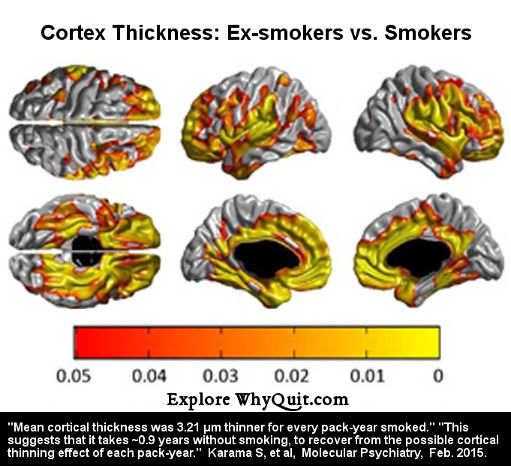
Is smoking damaging your thinking and memory?
John R. Polito
More forgetful? What if each and every year of continued smoking is ever so slowly damaging your ability to think, reason and remember? A new study suggests that it is.
The below quotations are from a fascinating 2015 brain scan cortex thickness study in Molecular Psychiatry, the full-text of which is now available for free. First, a little background.
The cerebrum is the large main front portion of our brain. The outer layer of the cerebrum is called the cortex.
The cerebral cortex is composed of folded gray matter and is 2 to 4 millimeters in thickness. The cortex plays key roles in memory, attention, perception, awareness, thought, language, and consciousness.
Here are selected study quotes:
- "Cigarette smoking is associated with cognitive decline and dementia."
- "It is estimated that nearly 14% of Alzheimer's disease cases worldwide could be attributable to smoking."
- "Here we examine the association between smoking and brain cortical thickness..."
- "666 underwent brain imaging including high-resolution structural T1-weighted MRI scanning used for cortical thickness estimation." " There were 36 current smokers, 223 ex-smokers and 245 participants with no history of smoking."
- "Scanning showed that current smokers had a generally thinner cortex than those who had never smoked (Figure 2a). Many of the most significant regions of associations were in prefrontal areas. Nonetheless, associations were widespread, including most of the cortex and sparing only some primary motor/sensory and occipital areas."
- "Comparing ex-smokers with current smokers revealed a similar but less extensive pattern of thinner cortex for current smokers."
- "A highly significant association between smoking status and mean cortical thickness was observed."
- "Rate of thinning in current smokers, revealed, within areas of pack-years-associated cortical thinning, that mean cortical thickness was 3.21 μm thinner for every pack-year smoked."

- "This suggests that it takes ~0.9 years without smoking, to recover from the possible cortical thinning effect of each pack-year."
- "On this basis and given that the average pack-years in this sample's current and ex-smokers was 29.7, it took roughly 25 years without smoking for differences in cortical thickness to no longer be observed between ex-smokers and those that never smoked."
- "This study demonstrates a dose-dependent negative association between cigarette smoking and cortical thickness that is more extensive than previously reported."
- "Findings here suggest that cortical recovery could take as little as a few weeks to more than a theoretical 140 years (mean of ~25 years for t he LBC1936), depending on the amount smoked over one's lifetime."
Study Citation: Karama S, Ducharme S, Corley J, Chouinard-Decorte F, Starr JM, Wardlaw JM, Bastin ME, Deary IJ. Cigarette smoking and thinning of the brain's cortex. Molecular Psychiatry. 2015 Jun;20(6):778-85.
Question: Why wait another moment before beginning the most amazing awakening you'll likely ever know?
Nicotine addiction is a brain dopamine pathway wanting disorder in which hijacked pathways leave you believing that your next nicotine fix is as important as your next meal.
It's not. It's a deadly lie. Contrary to the influence of thousands of old wanting satisfaction memories, memories which collectively form your prison cell bars, everything done while under nicotine's influence can be done as well or better without it.
The more you understand your chemical dependence and the recovery process, the less frightening coming home becomes.
Explore WhyQuit. Pour yourself into Joel's Library. Visit Turkeyville and witness smart turkey in action.
Knowledge isn't just power but a quitting method. Why not use your remaining brain gray matter to become far wiser than nicotine's grip upon it.
Just one lesson, pearl of wisdom and epiphany at a time, yes you can!
Breathe deep, hug hard, live long,
John R. Polito
Nicotine Cessation Educator

